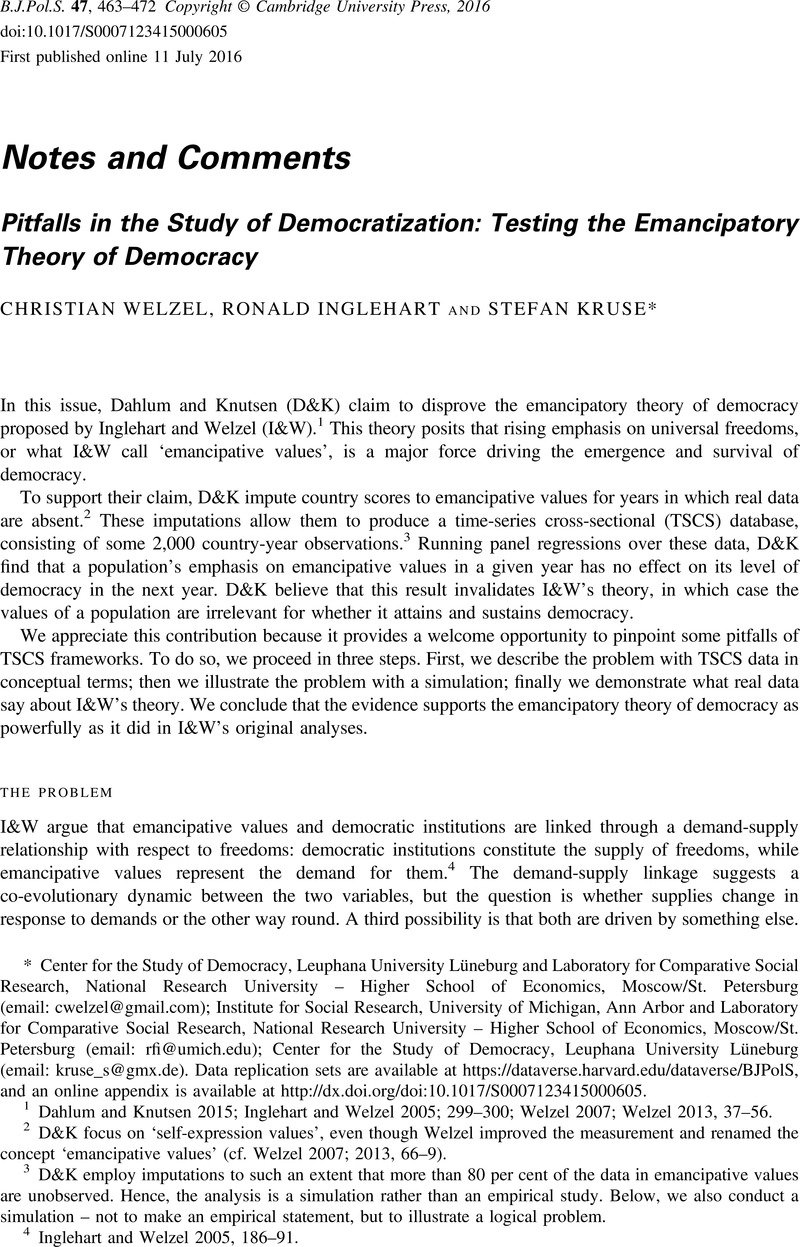Crossref Citations
This article has been cited by the following publications. This list is generated based on data provided by
Crossref.
Gomes, Marcio de Lucas
and
Aquino, Jakson Alves de
2018.
Violência e satisfação com a democracia no Brasil.
Opinião Pública,
Vol. 24,
Issue. 1,
p.
209.
Ruck, Damian J.
Matthews, Luke J.
Kyritsis, Thanos
Atkinson, Quentin D.
and
Bentley, R. Alexander
2019.
The cultural foundations of modern democracies.
Nature Human Behaviour,
Vol. 4,
Issue. 3,
p.
265.
Coppedge, Michael
Gerring, John
Glynn, Adam
Knutsen, Carl Henrik
Lindberg, Staffan I.
Pemstein, Daniel
Seim, Brigitte
Skaaning, Svend-Erik
Teorell, Jan
Altman, David
Bernhard, Michael
Bizzarro, Fernando
Krusell, Joshua
Maguire, Matthew
Marquardt, Kyle
McCann, Kelly
Mechkova, Valeriya
Miri, Farhad
Pernes, Josefine
Staton, Jeffrey
Stepanova, Natalia
Tzelgov, Eitan
and
Wang, Yi-ting
2020.
Varieties of Democracy.
Barceló, Joan
2020.
Are Western-Educated Leaders Less Prone to Initiate Militarized Disputes?.
British Journal of Political Science,
Vol. 50,
Issue. 2,
p.
535.
KURYLO, I. O.
2021.
Emancipative Values and Reproductive Behavior in the Context of Demographic Modernization (Based on World Values Survey (2017—2020) Data).
Demography and social economy,
p.
37.
Struwig, Jarè
Roberts, Benjamin J.
and
Gordon, Steven L.
2021.
‘Dark Cloud with a Silver Lining’? The Prospect of a Rise in Material Values or a Post-Material Turn in Post-Pandemic South Africa.
International Journal of Sociology,
Vol. 51,
Issue. 1,
p.
48.
Lima, Marcus E. O.
de França, Dalila X.
Jetten, Jolanda
Pereira, Cícero R.
Wohl, Michael J. A.
Jasinskaja-Lahti, Inga
Hong, Ying-yi
Torres, Ana Raquel
Costa-Lopes, Rui
Ariyanto, Amarina
Autin, Frédérique
Ayub, Nadia
Badea, Constantina
Besta, Tomasz
Butera, Fabrizio
Fantini-Hauwel, Carole
Finchilescu, Gillian
Gaertner, Lowell
Gollwitzer, Mario
Gómez, Ángel
González, Roberto
Jensen, Dorthe Høj
Karasawa, Minoru
Kessler, Thomas
Klein, Olivier
Megevand, Laura
Morton, Thomas
Paladino, Maria Paola
Polya, Tibor
Renvik, Tuuli Anna
Ruza, Aleksejs
Shahrazad, Wan
Shama, Sushama
Smith, Heather J.
Teymoori, Ali
and
van der Bles, Anne Marthe
2021.
Materialist and post-materialist concerns and the wish for a strong leader in 27 countries.
Journal of Social and Political Psychology,
Vol. 9,
Issue. 1,
p.
207.
Brunkert, Lennart J.
2022.
Overselling democracy–claiming legitimacy? The link between democratic pretention, notions of democracy and citizens' evaluations of regimes' democraticness.
Frontiers in Political Science,
Vol. 4,
Issue. ,
TAI, YUEHONG ‘CASSANDRA’
HU, YUE
and
SOLT, FREDERICK
2024.
Democracy, Public Support, and Measurement Uncertainty.
American Political Science Review,
Vol. 118,
Issue. 1,
p.
512.
Tsai, Ming-Chang
and
Peng, Ssu-Chin
2025.
Postmaterialism, Generational Replacement and Value Change: An Age-Period-Cohort Analysis of the US, Japan, Türkiye and China.
Social Indicators Research,
Vol. 176,
Issue. 1,
p.
173.
Liu, Haijiang
Cao, Yong
Wu, Xun
Qiu, Chen
Gu, Jinguang
Liu, Maofu
and
Hershcovich, Daniel
2025.
Towards realistic evaluation of cultural value alignment in large language models: Diversity enhancement for survey response simulation.
Information Processing & Management,
Vol. 62,
Issue. 4,
p.
104099.



